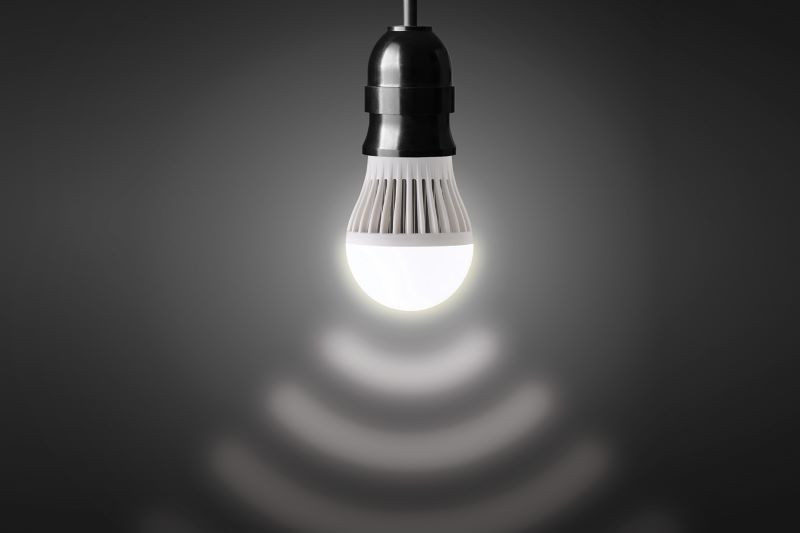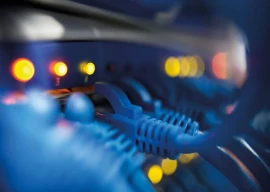
A new and innovative technology is on the horizon, with the potential to transform how we connect to the internet. Known as Li-Fi, this emerging technology offers distinct advantages over traditional Wi-Fi, though it's still too early to determine its full impact on broadband internet in our homes.
What is Li-Fi?
Light Fidelity, or Li-Fi, utilises light to transmit data, setting it apart from Wi-Fi, which relies on radio waves. This method promises speeds up to 100 times faster than Wi-Fi. Research into Li-Fi has been ongoing since the early 2000s, with German physicist Harald Haas and his team pioneering the technology by discovering light's capability for two-way data transmission.
The technology gained momentum when the French company Oldecomm, a leader in the field, began experimenting with Li-Fi in 2008. Last month, Europe’s Ariane 6 rocket launched into space, carrying out four experiments, one of which tested Li-Fi technology.
How does Li-Fi work?
Li-Fi functions as a Visible Light Communications system, transmitting data from LED light bulbs. These bulbs emit pulses of light that carry information, much like Morse code. Although this process is invisible to the naked eye, compatible devices can rapidly decode the information.
The impact on internet?
Since its debut in 1996, Wi-Fi has undergone significant advancements, with developments like Wi-Fi 6 and 6E, and the recent introduction of Wi-Fi 7. Li-Fi, however, offers a significant speed advantage, potentially reaching up to 224,000 megabits per second. This could be particularly beneficial for smart cities, virtual reality, 4K streaming, and online gaming, where low latency is crucial.
The LiFi Group, a pioneer in commercialising Li-Fi, highlighted the technology's added security benefits. A spokesperson stated, “Security is another key advantage of Li-Fi because the signals are confined to the area illuminated by the light source and cannot penetrate walls. The risk of unauthorised access is greatly reduced.”
Li-Fi also avoids the electromagnetic interference common with Wi-Fi and produces less radiation, making it a potentially safer option for home use. However, as the technology is still in its early stages, its full impact won’t be seen until it’s more widely implemented.
Currently, Li-Fi remains in the research phase in the US and other parts of the world. It may take a few more years before it becomes mainstream, with Oldecomm predicting a rollout between 2024 and 2029, depending on company investments.
Despite this, Li-Fi is already being explored across various industries. The LiFi Group emphasises its importance for sectors like defence and government, where secure data transfer is critical. The aviation industry is also adopting the technology, as demonstrated by Spectrum Networks LLC in Washington.
In the US, companies such as VLNComm in Charlottesville and Signify in New Jersey are leading the charge in developing Li-Fi. Their work is expected to lay the foundation for the widespread adoption of this technology.
What’s next for Li-Fi?
A spokesperson for the LiFi Group shared that discussions are ongoing with leading companies across various sectors, including consumer electronics, automotive, and telecommunications. “The growing demand for innovative connectivity solutions, especially in environments where traditional wireless technologies face limitations, will likely drive more companies to explore and invest in Li-Fi in the near future,” they said.
The bottom line on Li-Fi
Li-Fi shows great promise as an alternative to Wi-Fi, with potential benefits across multiple industries. However, it’s still too early to predict whether Li-Fi will completely replace Wi-Fi. The technology is gaining traction, with increasing company interest and research funding. Until its full impact is realised, we’ll keep you updated on the latest developments in this exciting field.
This feature appeared on CNET website.
1724302092-0/Taylor-Swift-(3)1724302092-0-405x300.webp)




1721991438-0/BeFunky-collage-(29)1721991438-0-270x192.webp)



1724399654-0/iPhone-16-(1)1724399654-0-270x192.webp)
1719318906-0/BeFunky-collage-(9)1719318906-0-270x192.webp)















COMMENTS
Comments are moderated and generally will be posted if they are on-topic and not abusive.
For more information, please see our Comments FAQ